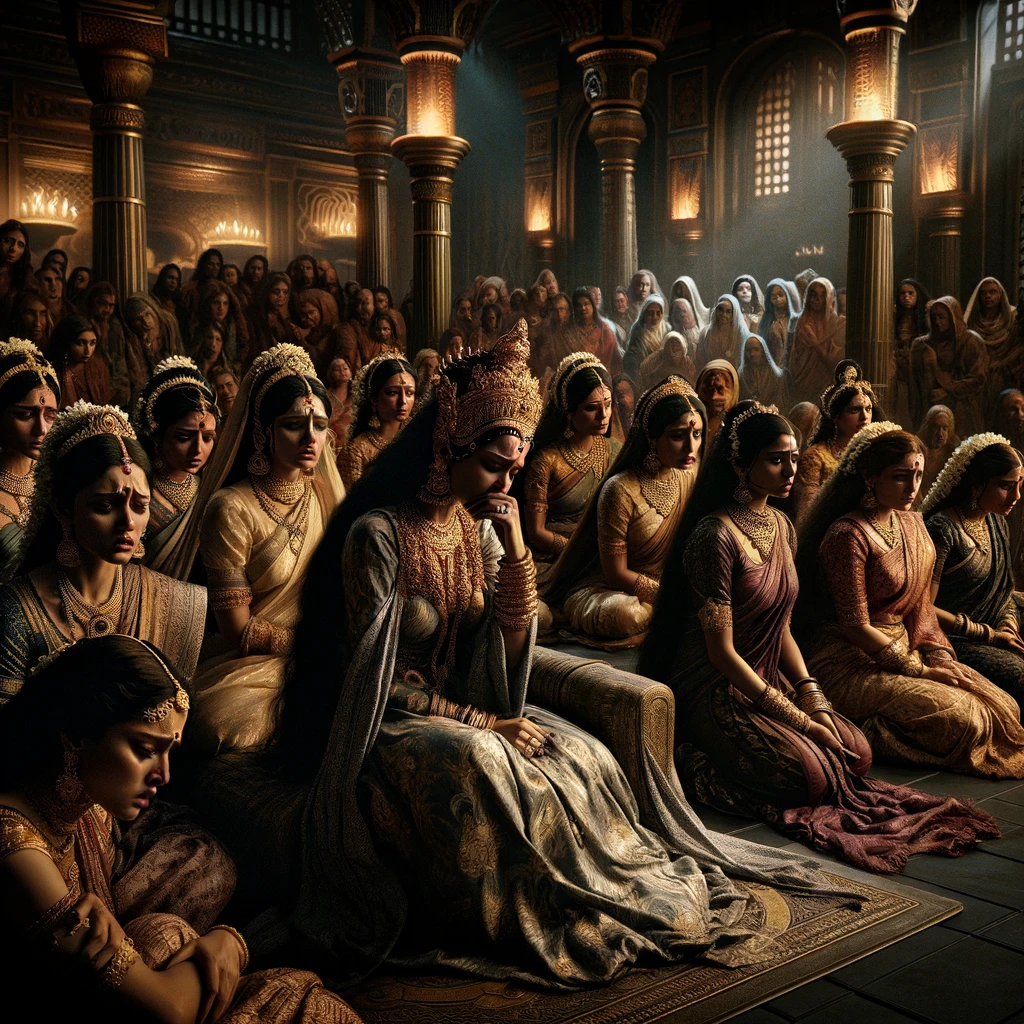Ravana’s wives were emaciated by grief when they heard that Ravana had been killed by the great soul Rama, and rushed out of their residential quarters. Though servants were trying to hold them back, they rolled in the dust on the ground, with disheveled hair, stricken as they were with grief, like cows whose calves had died. They came out of the northern gate accompanied by rakshasas and entered the grim battlefield in search of their dead husband. Crying out: “O royal prince! O my lord!” they ran all over that area which was strewn with headless bodies and muddied with blood. Bellowing like female elephants, with their eyes overflowing with tears and being overwhelmed with grief for their husband, they looked like elephants whose herd leader had died. Then they saw the gigantic body of Ravana lying dead on the ground. He was most valorous and splendorous, and resembled a mass of blue eye cosmetic.
Seeing their husband lying down in the dust of the battlefield, they hurriedly threw themselves on his limbs, like cut forest vines. Embracing him out of great regard, one wailed, one grasped his feet, and another hung on to his neck. One threw up her arms and rolled on the ground. Another one fainted as soon as she saw the face of her deceased husband. Placing his head in her lap, one cried as she looked at his face, bathing his face with tears, as dew would cover a lotus flower. Afflicted to see their husband lying dead on the ground, the ladies wailed in many ways because of grief and exclaimed:
“Here on the battleground lies the corpse of he who terrified Lord Indra and Yamaraja, who deprived Kuvera, king of the yakshas, of his aerial ship Pushpaka, who instilled fear into the hearts of the great gods, gandharvas and sages. He who had no fear of gods, demons or serpents has met with this calamity at the hands of a human being. Here lies dead a warrior who could not be killed by gods, danavas or rakshasas, but who has been killed by a human who walks on the ground. Ravana has been consigned to death like an impotent person by a mortal, though he could not be killed by gods, yakshas or demons.”
Speaking in this way, the aggrieved women began wailing. Stricken with grief, they continued wailing again and again: “You abducted Sita for your own destruction, ignoring the good advice which your well-wishers always gave you. Rakshasas have been killed, you yourself and we too have been felled all at the same time. Although your dear brother Vibhishana was giving you good advice, out of delusion you treated him harshly because of your desire for self-destruction, which has now been seen. If you had returned Sita to Rama, we would not have suffered this horrible misfortune which has destroyed our root. In fact, your brother Vibhishana would have had his desire fulfilled, Rama would have become a friend, none of us would be widows and our enemies would not have their desire satisfied. Out of your mercilessness, you forcibly kept Sita restrained, thus we three—the rakshasas, you and ourselves—have been equally destroyed. O best of rakshasas, surely your acting according to your desire was not sufficient to cause your death. Destiny makes everyone act. One who is killed by destiny dies. This destruction of monkeys, rakshasas and yourself has taken place under the influence of destiny. Once in motion, the force of destiny cannot be obstructed by wealth, desire, prowess or command.”
Lamenting in this way like female ospreys, the eyes of Ravana’s aggrieved consorts overflowed with tears.
Thus completes 110th Chapter of Yuddha Kanda of the glorious Ramayana of Valmiki, the work of a sage and the oldest epic.
Sriman Moola Rama Vijayate


